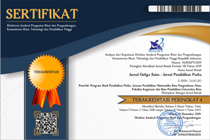EFFECTIVENESS OF THE IMPLEMENTATION OF MEANINGFUL INSTRUCTIONAL DESIGN LEARNING MODEL IN IMPROVING INTEREST AND STUDENT LEARNING OUTCOMES OF PHYSICS IN CLASS X SENIOR HIGH SCHOOL
Abstract
The purpose of this action research is to increase the interest and learning outcomes of physics students with the implemention of the Meaningful Instructional Design Model (MID). The influence of internal factors experienced by students in learning physics include difficulties in understanding the material and solving the questions correctly, so that students' learning interest is low. Meaningful Instructionnal Design Model includes a learning model that prioritizes learning meaningfulness, which should be able to increase students' interest and learning outcomes. This research is a classroom action research conducted in two cycles. The subjects of this study were students of class XI MIPA4, SMA Negeri 1 Pekanbaru. The research instrument used observation sheets for interest and test sheets for physics learning outcomes in fluid material. Data is analyzed descriptively in percentage representation. The results of the research obtained the interest of students in physics learning, experiencing an increase from cycle I to cycle II. The same thing for learning outcomes of physics students also increased from cycle I to cycle II, with the average results obtained very good category. Thus the implementation of the Meaningful Instructionnal Design (MID) model is effective in increasing interest and learning outcomes of students of class XI MIPA4 SMA Negeri 1 Pekanbaru, in learning fluid material.
Keywords
Full Text:
PDFReferences
Abdul Majid, 2014. Strategi Pembelajaran. Remaja Rosdakarya, Bandung.
Ahmad Shabri, 2005. Strategi Belajar Mengajar dan Micro Teaching. Quantum Teaching, Jakarta.
Degeng, I Nyoman S., 2001. Mencari Pendekatan Baru Pemecahan Masalah. Belajar. UNM, Malang.
Dahar, Ratna Willis, 2011. Teori Belajar dan Pembelajaran. Erlangga, Jakarta.
Djamarah, 2002. Rahasia Sukses Belajar. Rineka Cipta, Jakarta.
Drost, J., 2003. Proses Pembelajaran Sebagai Proses Pendidikan. Jakarta.
Purwanto, 2011. Evaluasi Hasil Belajar. Pustaka Pelajar, Yogyakarta.
Riduwan, 2009. Belajar Mudah Penelitian untuk Guru, Karyawan dan Peneliti Pemula. Alfabeta, Bandung.
Slameto, 2003. Belajar dan Faktor-faktor yang Mempengaruhinya. Rineka Cipta, Jakarta.
Shoimin, Aris, 2014. Model Pembelajaran Inovatif Dalam Kurikulum 2013. ArRuzz Media, Yogyakarta.
Sritresna, T., 2015. Meningkatkan Kemampuan Koneksi Matematis Siswa Melalui Model Pembelajaran Cooperative Meaningful Instructional Design J. Mtk. Vol 5 No. 1. http://jurnalmtk.stkip-garut.ac.id/data/ edisi5/vol1/teni.pdf. (02Februari2019).
Suharsimi Arikunto, 2006. Prosedur Penelitian Suatu Pendekatan Praktik. Rineka Cipta, Jakarta.
Susanto. Ahmad, 2014. Teori Belajar dan Pembelajaran di Sekolah Dasar. Kencana, Jakarta.
DOI: http://dx.doi.org/10.31258/jgs.7.1.24-30
Refbacks
- There are currently no refbacks.
Copyright (c) 2019 Sulistia Budi

This work is licensed under a Creative Commons Attribution 4.0 International License.
Jurnal ini terdaftar dan terindeks pada:
- Crossref
- Google Scholar
- Crossref
- Garuda
- Sinta
- Researchgate
- Dimensions
- Base
- Scilit
- OneSearch
- Road
- CiteFactor
- ResearchBib
- WorldCat



















